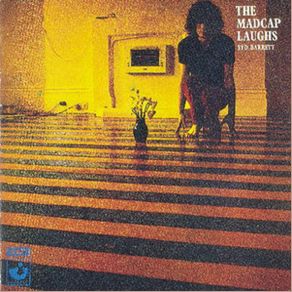The Madcap Laughs
Download links and information about The Madcap Laughs by Syd Barrett. This album was released in 1970 and it belongs to Rock, Pop, Psychedelic genres. It contains 19 tracks with total duration of 57:03 minutes.

|
|
|---|---|
| Artist: | Syd Barrett |
| Release date: | 1970 |
| Genre: | Rock, Pop, Psychedelic |
| Tracks: | 19 |
| Duration: | 57:03 |
| Buy it NOW at: | |
| Buy on iTunes $11.99 | |
| Buy on iTunes $11.99 | |
| Buy on Amazon $11.49 | |
| Buy on Songswave €1.60 | |
| Buy on iTunes $9.99 | |
| Buy on Songswave €1.60 | |
Tracks
[Edit]| No. | Title | Length |
|---|---|---|
| 1. | Terrapin | 5:04 |
| 2. | No Good Trying | 3:26 |
| 3. | Love You | 2:30 |
| 4. | No Man's Land | 3:03 |
| 5. | Dark Globe | 2:02 |
| 6. | Here I Go | 3:11 |
| 7. | Octopus | 3:47 |
| 8. | Golden Hair | 1:59 |
| 9. | Long Gone | 2:50 |
| 10. | She Took a Long Cold Look | 1:55 |
| 11. | Feel | 2:17 |
| 12. | If It's In You | 2:26 |
| 13. | Late Night | 3:11 |
| 14. | Octopus (Takes 1 & 2) | 3:09 |
| 15. | It's No Good Trying (Take 5) | 6:22 |
| 16. | Love You (Take 1) | 2:28 |
| 17. | Love You (Take 3) | 2:11 |
| 18. | She Took a Long Cold Look At Me (Take 4) | 2:44 |
| 19. | Golden Hair (Take 5) | 2:28 |
Details
[Edit]Wisely, The Madcap Laughs doesn't even try to sound like a consistent record. Half the album was recorded by Barrett's former bandmates Roger Waters and Dave Gilmour, and the other half by Harvest Records head Malcolm Jones. Surprisingly, Jones' tracks are song for song much stronger than the more-lauded Floyd entries. The opening "Terrapin" seems to go on three times as long as its five-minute length, creating a hypnotic effect through Barrett's simple, repetitive guitar figure and stream of consciousness lyrics. The much bouncier "Love You" sounds like a sunny little Carnaby Street pop song along the lines of an early Move single, complete with music hall piano, until the listener tries to parse the lyrics and realizes that they make no sense at all. The downright Kinksy"Here I Go" is in the same style, although it's both more lyrically direct and musically freaky, speeding up and slowing down seemingly at random. Like many of the "band" tracks, "Here I Go" is a Barrett solo performance with overdubs by Mike Ratledge, Hugh Hopper, and Robert Wyatt of the Soft Machine; the combination doesn't always particularly work, as the Softs' jazzy, improvisational style is hemmed in by having to follow Barrett's predetermined lead, so on several tracks, like "No Good Trying," they content themselves with simply making weird noises in the background. The solo tracks are what made the album's reputation, though, particularly the horrifying "Dark Globe," a first-person portrait of schizophrenia that's seemingly the most self-aware song this normally whimsical songwriter ever created. Honestly, however, the other solo tracks are the album's weakest tracks, with the exception of the plain gorgeous "Golden Hair," a musical setting of a James Joyce poem that's simply spellbinding. The album falls apart with the appalling "Feel." Frankly, the inclusion of false starts and studio chatter, not to mention some simply horrible off-key singing by Barrett, makes this already marginal track feel disgustingly exploitative. But for that misstep, however, The Madcap Laughs is a surprisingly effective record that holds up better than its "ooh, lookit the scary crazy person" reputation suggests.